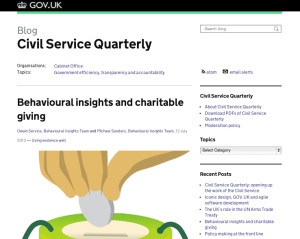Blogging makes it easier for government to talk about its work, share information and ideas, and connect with those with a common concern.
A few months ago, we launched the new GOV.UK blogging platform - which is designed to help people from within government blog as easily and cost-effectively as possible.
It’s a space which any government organisation can use to write about what they’re up to, or to develop practice or theory in a particular field.
We thought we’d tell you a bit more about the platform and the blogs already on it - and, if you’re reading this from within government, help you think about whether it’s the right space for you.
Blogging in government
We developed the GOV.UK blogging platform with a close eye on the types of format that were already working well in government.

For example, we worked hard to understand the needs of colleagues in the Department for International Development and the Foreign and Commonwealth Office, who have excellent and well-established blogs, providing personal testimony to the work they’re doing in different countries. We referenced the superb digital blogs from our colleagues at the Department of Health and the Department of Business, Innovation and Skills.
And we’ve also looked within our experience - we’ve used the GDS blog to show how the GOV.UK site went through its journey to launch and beyond; talked about our shift to fixing transactions; and admitted when things haven’t worked.
But not all government organisations are as well set up to blog - and there are clear economic benefits to sharing blogging capability. Our blogging platform - developed in WordPress using a company on the G-Cloud framework - is designed to be highly scalable. It’s also robust, secure, and free to use for any government organisation who can meet a few basic criteria for using it.
The platform’s also designed to keep pace with the main GOV.UK platform - such as sharing a look and feel, and method of signing up to email subscriptions - so that users will have a consistent experience on GOV.UK no matter where they begin their visit.
Who’s blogging already?
A quick look at some of the dozen or so blogs already live on the GOV.UK blogging platform gives a pretty good indication of the opportunities offered.
For example:
-

DVLA's digital transformation blog on GOV.UK every digital exemplar project is encouraged to set up a blog to tell the story of their product development, and to share their learnings - DVLA and DWP are first off the blocks, but there will be plenty of others joining shortly
-
our own Inside GOV.UK blog, for people who publish content to the GOV.UK site, discusses what we’re working on - for example, finding better ways of showing related content
-
the Civil Service Quarterly blog contains detailed, unique insight from within the civil service - such as how to improve charitable giving through behavioural insight
-

VOSA's Matters of Testing blog on GOV.UK VOSA’s Matters of Testing blog for the MOT testing industry showcases a few MOT horror stories such as this one, discovered by Binny from Chana Car Centre (pictured right)
We’re also particularly proud of the History of Government blog, which has, for the first time, given the government a single place to talk about its history. Curated by the National Archives, it features contributions from across government and from a number of leading historians, supported by the History and Policy Group at King’s College London.
Can you guess, for example, which former prime ministers volunteered to pay for an ironing board themselves or found the prospect of:
"a woman’s intrusion into the House of Commons as embarrassing as if she burst into my bathroom when I had nothing with which to defend myself, not even a sponge". (answer here)
What next for GOV.UK blogs

We’re keen to make our blogs a more integrated part of the main GOV.UK site - and to make it possible, for example, for departments to feature blogposts on their homepage, and for relevant blogposts to turn up in the GOV.UK search.
We’ve also got a bit more work to do to help those departments who’d like to move existing blogs over to our platform, to do so.
And of course, like every other bit of GOV.UK, we’ll continue testing and improving the product itself.
If you’re from within government and you’d like to know more about setting up a blog on GOV.UK, then you can find out more in (can you guess...?) our blogpost here.
Follow Graham on Twitter: @gkfrancis

14 comments
Comment by simonfj posted on
Hi Graham,
Just revisiting this one again to see of you've made any progress with a common approach to tagging (posts). I've been using blogs.gov.uk as an illustration of what happens when one doesn't. i.e. one simply gets a lengthy list of posts from across the departments. (although the OPM group are doing a good job with trying to engage their audience)
This is an ongoing discussion around making the topical/thematic groups inside orgs more visible. This what it looks like from an .eu perspective. http://lnkd.in/dRh7P7B
Obviously, as hudl mentions, we're not at the point where any group is actually engaging with their audience yet, and trying to do some community building. https://www.gov.uk/community-development-framework
That discussion is taking place down on the OPM LinkedIn group though, as many topical groups in departments (and parliament) experiment with how to engage with citizens. e.g. NHS citizen.
Blogs always tend to be the first step in orgs, in opening things up and bringing audiences to a place - before CM's can take the next step and learn how to use other tools to atttact and keep an audience. But the common tagging is quite important for people like me who are attempting to have the groups within National governments identify/discover one another and collaborate. cheers.
Comment by graham posted on
Hi Simon
Good points. Looking at ways to better aggregate content across blogs is definitely still on our to-do list - unfortunately, it's just one of many priorities (see Neil Williams' recent blogposts on the GOV.UK roadmap for an idea of these...)
Best
Graham
Comment by hudl forum posted on
It's certainly a step in the right direction and should hopefully enable the public to understand the inner workings of the government a bit better.
Hopefully, by including a comments section (Like this one) the public will be able to make their views heard, but will blog comments get listened to or ignored?
Comment by Hannah Kops posted on
Absolutely brilliant!
Comment by Mark Wright posted on
Graham,
That would be really helpful.
Comment by Mark Wright posted on
The Single Tier Programme has recently entered its Discovery phase and
has a desire to set up a Blog. The Programme would ideally like to host
the Blog on the Gov.uk Platform, or as appropriate. The Programme
is not a GDS exemplar and we are currently receiving conflicting advice regarding the process we should be following from colleagues with
established Blogs. I am therefore seeking the necessary advice to
commence the process and establish who I should be speaking to in
order to make the necessary arrangements.
Comment by Graham Francis posted on
Hi Mark - thanks for your interest. Info around our process is at the blogpost here: https://insidegovuk.blog.gov.uk/2013/05/24/gov-uk-blogs-how-to-get-one/. Probably your best next step, if you haven't done so already, is to chat to a few people in the DWP digital team - I'll e-mail you a couple of likely names.
Comment by Boris Gumty posted on
And the elephant in the room is that you're not dogfooding...
Comment by Graham Francis posted on
Well spotted. As the post mentions, we've got a bit more work to do to make sure that when we migrate content over from existing blogs, we do so cleanly and efficiently. But we're planning for the GDS blog to be one of the first to move over to the new platform, in the next few months.
Comment by juliachandlerJulia posted on
Good coment - confess I was surprised when clicking on the link at the end to "All governmetn blogs" not to see this one there - it does share the look and feel.
Also have a question about how people will find related blogs. There are 2 individuals from Health there, but if you stumbled across on via google or a link to a post, you wouldn't know there were others. The list is quite short at the moment, which is why the 2 names stand out, but imagine when there are hundreds (and no sense of order or grouping?)
Comment by Graham Francis posted on
Thanks Julia. Really good points.
On reflection, the link title 'all government blogs' currently gives a misleading impression - it just takes users to a list of all the blogs on the GOV.UK blog platform. We'll look at this again.
On finding related blogs, as a first - albeit fairly crude - step, we'd encourage blog owners to link in their right hand navigation to related sites, as we do on https://insidegovuk.blog.gov.uk.
A more satisfying solution would involve making the blogs an integrated (rather than standalone) part of GOV.UK - so that if, for example, you explored the 'social care' topic on GOV.UK you'd see relevant blogposts about the subject as well as policies, publications etc. We'll be looking at how do do this later in the year.
Comment by juliachandler posted on
Sounds good - thanks. I guess the idea of "all government blogs" is probably impossible, can't imagine anyone who would really want ALL, but sector/thematic groups as you suggest - among other relevant material, should add value.
Main thing is to be able to distinguish between blog and approved/agreed policy content - or risk that all "official" blogs are so anodyne that they dont really do what they should: encourage interaction and debate or response.
Comment by Chris Hollifield posted on
Are analytics tools available to bloggers in the new system?
Comment by Graham Francis posted on
Yes, totally. Every blog gets its own Google Analytics dashboard, which blog owners will be able to manage directly.